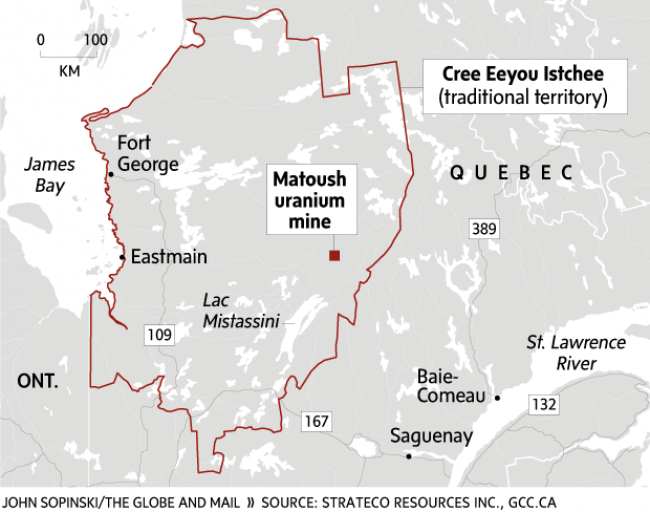Articles Menu

Tempers in some quarters of Quebec are flaring after the head of Canada’s nuclear safety commission slammed a report by the province’s environmental regulation agency for allegedly “misleading Quebeckers and Canadians” on the safety of uranium mining.
In a damning letter to Quebec Environment Minister David Heurtel, the president and chief executive officer of the Canadian Nuclear Safety Commission – Michael Binder – says it “is very troubling to have the [provincial agency] present your government with conclusions and recommendations that lack scientific basis and rigour.”
Quebec’s Bureau d’audiences publiques sur l’environnement (BAPE) recently released a 626-page report recommending to the Environment Minister it would be premature at this time to authorize development of a uranium mining industry in the province.
There are many uncertainties and unanswered questions about the environmental, health, social and other risks and concerns involved, the three-person BAPE panel, headed by former Le Devoir environment reporter Louis-Gilles Francoeur, cautions.
The Quebec government said in response to the report’s release it will set up an interdepartmental committee to assess the findings. The province’s Cree Nation strongly opposes a project to build Quebec’s first uranium mine – Matoush, in the Otish Mountains of Northern Quebec – by Strateco Resources Inc.
Matoush was cleared for underground exploration by the CNSC and the federal Environment Minister based on detailed environmental impact studies, but the project has been held up for years by successive Quebec governments.
To “suggest that uranium mining is unsafe is to imply that the Canadian Nuclear Safety Commission (CNSC) and the Government of Saskatchewan have been irresponsible in their approval and oversight of the uranium mines of Canada for the last 30 years,” Dr. Binder says in his letter, dated July 27 and copied to Pierre Baril, president of the BAPE.
Characterizing CNSC staff as internationally recognized “scientific and regulatory experts,” Dr. Binder says they provided the BAPE panel with “solid, factual evidence” on how Canadian nuclear-related activities are among the safest and most secure in the world. Uranium is used principally as fuel for nuclear reactors.
The BAPE’s recommendation is “based on the perceived lack of social acceptance [of uranium mining] and not on proven science,” Dr. Binder adds.
The letter triggered a slew of newspaper columns, editorials, op-ed pieces and letters, including a comment in La Presse by Matthew Coon Come, Grand Chief of the Grand Council of the Crees, who said the CNSC promotes nuclear activities in Canada. That provoked a written response from Dr. Binder denying that his agency engages in nuclear promotion.
Retired finance and high-tech businessman Jacques Dagenais wrote in an opinion piece in Le Devoir that Dr. Binder is known for making “inopportune” pro-industry comments that are “incompatible with the role of president of a tribunal bound to neutrality and obliged to practice discretion.”
A spokesman for Quebec Environment Minister Mr. Heurtel said Dr. Binder’s letter represents a “serious criticism” and that its conclusions will be “analyzed with considerable rigour.”
BAPE spokeswoman Diane Paquin said it is agency policy never to comment on its reports or reaction to them. “The report speaks for itself,” she said.
In an e-mail, CNSC spokesperson Aurèle Gervais said, “The CNSC is not pro-nuclear, it is pro-safety.” The letter to Quebec’s Environment Minister was to correct the “erroneous conclusion” that uranium mining in Canada is unsafe, he added.

[End of article]